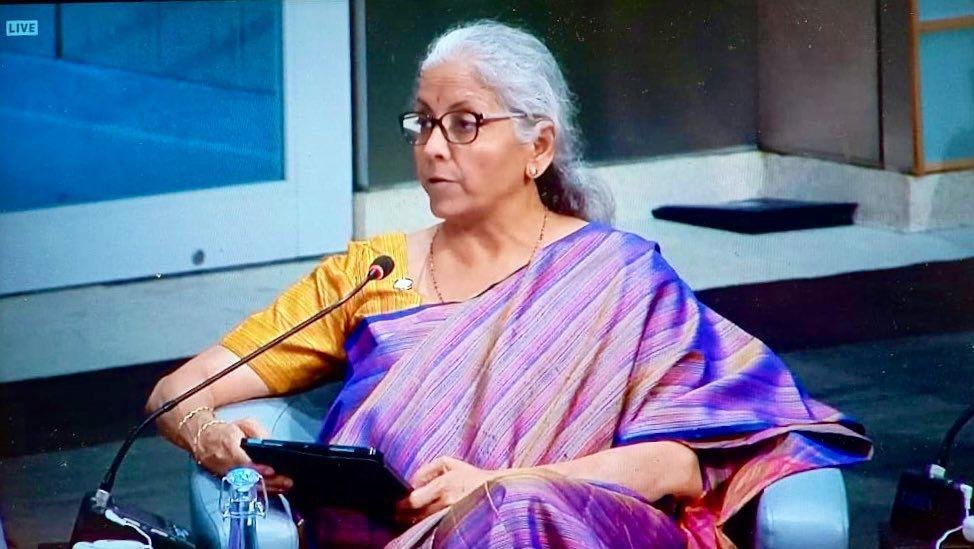FM urged the World Bank to avoid a unidimensional view of subsidies
Finance Minister Nirmala Sitharaman has urged the International Monetary Authority to increase resources available for emerging and low-income countries to safeguard the global financial system.
“I believe the IMF needs to increase resources available for emerging and low-income countries to safeguard the global financial system,” she said at the International Monetary and Financial Committee meeting in Washington DC on 15 Oct 2022.
“Therefore, concluding the 16th GRQ (Global Review Quota) by 15 December 2023 is vital for increasing the voting rights of emerging market economies (EMES) in line with their relative positions in the world economy,” Sitharaman said.
The Minister stated that a key downside risk to global recovery is the exacerbated debt distress in many low-income countries.
“It is, therefore, important that the Fund provides them necessary support to deal with balance of payments related vulnerabilities.”
In this context, Sitharaman welcomed the Fund’s recent initiative of “a new food shock window to help countries address food insecurity”.
Sitharaman also participated in the joint World Bank-International Monetary Fund (WB-IMF) Development Committee (DC) Annual Meetings 2022 held in Washington DC on 15 Oct 2022.
The Development Committee had specifically met to discuss two critical aspects that the world is facing:
The food and energy crisis – Weathering the storm
Achieving Climate and Development goals – The Financing Question
In her opening remarks, she pointed out, “This is an excellent opportunity to put our heads together and think about how best we can negotiate the multiple challenges and bring back long-term growth.
“Despite this year’s projected growth rate of 7% for the Indian economy, we remain concerned about the global economic outlook and geopolitical environment.”
Sitharaman stated that the Food and Energy Crisis paper rightly identifies energy efficiency as the “first fuel of choice”. Similarly, reducing crop loss and food waste should also be the “first intervention of choice” to ensure food security.
She urged the World Bank to avoid a unidimensional view of subsidies and to differentiate between distortive subsidies and targeted support to the vulnerable households.
While the quest for energy and food security necessitates non exclusion of fossil fuels from our energy mix, she informed that India has set up its first pure hydrogen producing plant as well as its first 2G bioethanol refinery this year.
Going forward, Sitharaman said that there are 3 clear opportunities for the World Bank Group:
Promoting behaviour change to increase energy efficiency and to reduce food losses. Programmes like the Lifestyle for the Environment (LiFE) launched by the Prime Minister of India on the World Environment Day in June 2022, in which David Malpass, president, World Bank Group, delivered a keynote address, can mainstream responsible consumption behaviour.
Helping all client countries in arranging concessional financing and technology transfer in areas like renewable and green energy.
Supporting regional integration not only through International Development Association (IDA) but also through International Bank for Reconstruction and Development (IBRD).
On financing climate and development goals, the Minister said that the WBG is uniquely placed to bring together all stakeholders for developing an investment strategy for climate and development finance.
“Yet, the world must never lose focus on the internationally agreed basic principle of common but differentiated responsibilities. This necessitates avoidance of a one-size fit-all approach.”
Sitharaman stated that mitigation of risks is essential for crowding in private capital.
While welcoming the launching of US$500 billion startup SCALE to democratize entrepreneurship, Sitharaman encouraged the World Bank to increase the share of grants from the current 5% level and to work below the country level to support projects with huge climate impact beyond the national borders.
She exhorted for prioritising consultations with key stakeholders throughout the formulation of the Country Climate and Development Reports (CCDRS), adding that following the “One Bank” approach are critical to their success.
While urging the World Bank to take the lead and also help build consensus across MDBs, the Minister pushed for the recommendations of the Independent Review of the Multilateral Development Banks’ (MDB) Capital Adequacy Frameworks commissioned by the G20 hold the key for sustained financing. fiinews.com










